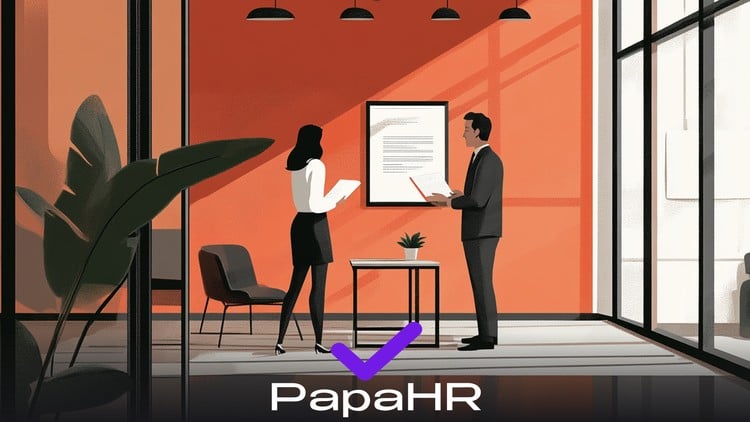
Employee Evaluation | Management | HR | OKR | KPI | Continuous Feedback | Talent Development | Performance Metrics
⏱️ Length: 3.5 total hours
⭐ 4.76/5 rating
👥 7,896 students
🔄 October 2025 update
Add-On Information:
Note➛ Make sure your 𝐔𝐝𝐞𝐦𝐲 cart has only this course you're going to enroll it now, Remove all other courses from the 𝐔𝐝𝐞𝐦𝐲 cart before Enrolling!
- Course Overview
- This course delves into modern performance management, moving beyond traditional annual reviews to embrace a dynamic, continuous feedback culture.
- Explore how robust appraisal systems are pivotal tools for fostering employee growth, aligning individual contributions with organizational objectives, and driving business success.
- Understand the evolving landscape of performance evaluation, where agility, fairness, and developmental focus transform it into a positive force for talent retention and engagement.
- Gain insights into integrating performance management with broader HR strategies, including compensation, career planning, and succession management.
- Discover how a proactive and transparent evaluation process enhances team cohesion, builds trust, and cultivates a high-performance work environment.
- Learn about the critical role of data-driven insights in performance assessment, ensuring objectivity and providing a clear basis for decision-making.
- Examine ethical considerations and best practices for ensuring fairness, mitigating bias, and promoting inclusivity throughout the review cycle.
- Requirements / Prerequisites
- Basic Understanding of Organizational Structure: Familiarity with common roles and reporting lines within a business environment is beneficial.
- Fundamental Communication Skills: An eagerness to improve interpersonal communication, active listening, and constructive dialogue for effective appraisals.
- Openness to New Management Philosophies: A willingness to critically examine traditional approaches and adopt modern, continuous feedback models.
- Access to a Computer with Internet Connection: Essential for accessing course materials and exploring relevant digital tools.
- No Prior HR or Management Experience Required: Accessible for individuals new to managerial roles, aspiring HR professionals, or those refining existing skills.
- Desire to Enhance Leadership Capabilities: Participants should genuinely wish to improve their ability to motivate, develop, and effectively guide teams.
- Commitment to Professional Development: A proactive attitude towards learning and applying new strategies for improving workplace performance and satisfaction.
- Skills Covered / Tools Used
- Strategic Goal Setting and Alignment: Mastering the art of translating organizational objectives into clear, measurable individual performance goals (e.g., leveraging OKRs and KPIs).
- Effective Feedback Delivery: Developing proficiency in giving and receiving constructive, timely, and actionable feedback that fosters growth.
- Coaching and Mentoring Techniques: Using performance reviews as opportunities for ongoing coaching, skill development, and career guidance.
- Bias Mitigation Strategies: Acquiring techniques to identify and reduce unconscious biases in evaluation processes, promoting fairness and equity.
- Data-Driven Performance Analysis: Utilizing performance metrics, survey data, and qualitative observations for objective assessment of employee contributions.
- Conflict Resolution in Reviews: Gaining skills to professionally navigate disagreements or emotional responses during appraisal discussions.
- Digital Performance Management Platforms: Familiarization with features and functionalities of HRIS and specialized software for managing performance cycles.
- Documentation and Record-Keeping: Understanding the importance of accurate, consistent, and legally compliant documentation of performance discussions.
- Talent Calibration and Succession Planning: Exploring how performance evaluations inform broader talent management initiatives, identifying high-potential employees.
- Engagement and Motivation Strategies: Discovering how effective performance management systems boost employee morale, job satisfaction, and commitment.
- Benefits / Outcomes
- Elevated Managerial Effectiveness: Empower yourself to lead your team with greater clarity, confidence, and impact, driving higher collective and individual performance.
- Improved Employee Engagement and Retention: Cultivate a workplace where employees feel valued, understood, and motivated, significantly reducing turnover.
- Fairer and More Objective Evaluation Processes: Implement structured, bias-aware appraisal systems perceived as equitable and transparent by team members.
- Enhanced Organizational Productivity: Directly contribute to improved departmental and company-wide efficiency by aligning individual efforts with strategic business goals.
- Stronger Talent Development Pipelines: Effectively identify skill gaps, nurture potential, and facilitate continuous learning and growth opportunities for your workforce.
- Robust Decision-Making for HR and Leadership: Provide reliable, data-backed insights for critical HR decisions related to promotions, compensation, and training investments.
- Reduced Legal Risks and Compliance Adherence: Ensure performance management practices are legally sound, defensible, and adhere to relevant employment regulations.
- Fostering a Culture of Continuous Improvement: Help embed a mindset where feedback is a gift, and growth is an ongoing journey for everyone.
- Personal Career Advancement: Equip yourself with in-demand skills crucial for leadership roles, making you a more valuable asset in any organization.
- Greater Accountability and Transparency: Establish clear expectations and consistent feedback loops that promote individual and team accountability for results.
- PROS
- Practical, Actionable Strategies: Provides immediately applicable methods and frameworks for transforming your performance review approach.
- Modern & Relevant Content: Focuses on contemporary best practices like continuous feedback, OKRs, and bias mitigation.
- Comprehensive Skill Development: Covers critical interpersonal and strategic skills required for effective performance management.
- Enhances Career Value: Equips learners with highly sought-after management and HR competencies, boosting their professional profile.
- Positive Organizational Impact: Directly contributes to a more engaged workforce, improved productivity, and stronger talent development.
- Structured Learning Path: Offers a clear, logical progression of topics to build foundational and advanced skills in a concise format.
- CONS
- Hands-on Practice Limitations: As an online, self-paced course, real-time scenario-based coaching and extensive practical application might be limited compared to in-person workshops.
Learning Tracks: English,Business,Human Resources
Found It Free? Share It Fast!